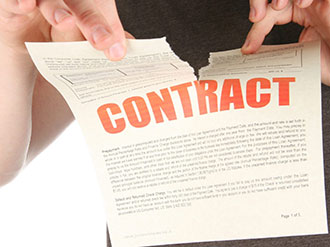|
|
Last Modified on Mar 05, 2025
When a contract is signed, most people have the best intentions to hold up their end of the deal. But things come up, and there are times when one or more of the patients doesn’t stick with these negotiated terms.
How should you handle the situation if you signed a written legal document and the deal isn’t going as planned? These terms and conditions are legally binding once there are signatures on the final draft. “ Breach of contract ” refers to the situation where someone violates the terms in an agreement.
Examples of a Breach of Contract
Usually, a breach of contract falls into one of these categories:
- Anticipatory Breach: One party notifies the other that they will not be fulfilling their legal obligations in the deal.
- Partial Breach: A significant portion of the contract is performed, but certain conditions of the agreement aren’t met.
- Total Breach: This substantial breach is also known as a material breach. It means that the contract performance is impossible, giving the injured party the ability to sue.
Here are a few common examples of a breach of contract:
- A party doesn’t meet their agreement and fails to fulfill as promised
- Promised goods or services aren’t received by the due date
- The contract is fraudulent
- There are material mistakes in the contract
- State contract law provisions are different from the private contract
- The provided goods or services don’t meet the expectations outlined in the agreement
- A party causes interference in the other party’s ability to fulfill their end of the deal
- A party refuses to perform their responsibilities fully according to the agreement
There are various situations where a breach of contract can occur. It is helpful to have an attorney help you navigate potential issues relating to your contract. Then you can seek damages or repair if you have a case.
Legal Issues Relating to Breach of Contract
Before you pursue a breach of contract claim, you must establish that a contract was in place and the other party didn’t follow the agreement. It’s your responsibility to present the evidence against the person you are taking to court, with the goal of showing the judge how the other party failed to meet the contract requirements.
Hiring a lawyer is a critical decision that you will make at this time. Your contract attorney will help you evaluate the contract’s validity, negotiate with the other party, and help you decide on the best course of action in the future.
Tapping into the expertise of a knowledgeable attorney is a critical step to protect your interests. Your lawyer can help you evaluate a variety of legal issues relating to the contract, such as:
- Contract Validity: First, you need to establish that you have an enforceable contract. Your lawyer will read the paperwork or advise you on the enforcement of an oral agreement.
- Fulfilled Obligation: Once the contract’s validity is determined, then it’s time to review each party’s responsibilities, as outlined in the agreement.
- Notification: Before pursuing legal action, your attorney can help with the proper notice to the other party. This step might correct the breach of contract to eliminate the need to move forward in court.
Examples of Damages for a Breach of Contract
Through the court proceedings, the judge will determine how substantial the breach was to decide on the damages and amount offered to the plaintiff.
- Monetary Damages: Most of the time, a breach of contract case results in monetary damages: a specific amount of money the party breaching the contract must pay to the other party.
- Compensatory Damages: A reimbursement of financial losses that resulted from the breach of contract. A variety of related expenses can fall in this category, such as the cost of finding a new provider for the services or loss of earnings.
- Nominal Damages: Sometimes, pursuing a breach of contract isn’t about the actual compensation. Nominal damages are used when there was no actual harm from the contract breach. Instead, the party is seeking a symbolic victory – a matter of principle to uphold the contract terms.
- Liquidated Damages: Certain contracts have clauses for liquidated damages, which is a pre-determined amount to put a price on the anticipated damages if a contract breach occurs.
- Punitive Damages: A judge might determine that the offending party needs to be punished in order to reduce the likelihood of that person recommitting the same contract breaches in the future. Punitive damages are rare and only applicable when the party behaved in a morally reprehensible way.
- Remedies in Equity: If non-monetary remedies are needed, then these things fall in the category of “remedies in equity.” Examples include contract termination, injunctions, account of profits, reformation, rescission of a contract, specific performances, and more.
- Restitution: The goal of restitution is to help the injured party to return to the position they were in before the breach of contract. Restitution brings the victim back to their initial status but doesn’t include additional damages for loss of profits or earnings.
Should You Seek Damages from a Breach of Contract?
Every situation is unique, which is why you must talk to an attorney to determine if you can receive damages from a breach of contract. The lawyer will help you verify the case. Then you will need to specify the damages you are seeking when filing the complaint. While these damage requests are filed initially, it’s up to the court to decide on the specific damages that are granted (if any damages are offered).
When you are involved in a contract dispute, a lawyer is a valuable resource to protect your interests. Talk to a business lawyer for a professional review of the contract and circumstances. Together, we will determine your options for recourse, then file a claim and prepare a defense.
It’s helpful to have a lawyer available to answer your questions and guide your decisions. Available legal services include everything from professional advice to representation in court if needed. If you would like to learn more, then talk to our team at Gainsburgh, Benjamin, David, Meunier & Warshauer, L.L.C. Call at your convenience to schedule a consultation: (504) 522-2304.





